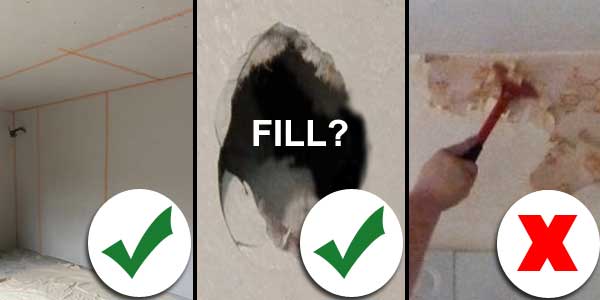In this article we will be looking at the different jobs a plasterer will do. As well as some jobs, that you should either do yourself or use a less skilled labourer.
Like any other trade plastering is a highly skilled profession. Fully qualified plasterers have been professionally trained, and will have many years, or even decades of experience. For this reason, they can command a high rate for their services.
A plasterer’s main purpose is to achieve a smooth flat finish on surfaces. They do this by applying plaster. This includes renders, backing plasters, and skimming finishing coats. The end result is a very high quality, seamless finish, that can be decorated and will last for many years to come.
Due to their skill, a plasterers hourly, or day rate will be considerably more than a labourer. This rate will not drop if they are doing unskilled tasks. Therefore, it can often make sense to carry out the unskilled jobs yourself and let them concentrate on the plastering.
Below are a few examples of jobs a plasterer will do. As well as a few that you should consider doing yourself or hire a less skilled labourer.
Do plasterers prep walls?

Prep work is an important part of any job in construction. As the saying goes, “fail to prepare and prepare to fail”. This is also true for plastering. In order for a plasterer to achieve a high quality finish, they may need to prep the sub surface before they apply plaster.
The prep they carry out will vary widely, based on the surface being plastered. For example:
- Before skimming boards, they will need to tape joints and add angle bead to any corners
- For other surfaces they may need to use some form of bonding to reduce suction and provide a decent key.
- They may need to apply a backing coat before skimming. The backing coat they use could vary based on different sub surfaces.
- They may need to prep a wall to take drywall adhesive before they dab boards onto a wall.
These are just a few examples, but as you can see, there is no one standard type of prep. The prep a plasterer carries out, will be highly dependent on the surface they are plastering. This is knowledge that comes with experience.
It is recommended that the plasterer carries out the prep work. This is a job that needs doing correctly, so the finished job is done to a high standard, as well as being a surface that lasts.
If you prep the surface yourself and the plaster fails, you can’t blame the plasterer. Therefore, it always makes sense to let the skilled plasterer prep the surfaces.
Do plasterers fill holes?
This is kind of a yes/no answer. A plasterer will have several ways they fill holes. This is especially true if they are filling deep holes or patching plasterboards. Some of these jobs may require a bit of additional knowledge and skill. Also, when done properly, they would often be considered as part of the prep work.
If you are dealing with a larger hole, then you may find a plasterer has a quick and easy way to fix the issue. Whereas you might not know where to start. In this scenario, it would make sense for the plasterer to do this as part of their prep work.
However, if we are talking about small holes that can easily be fixed with some filler, you may want to do it yourself. Although, it is unlikely this type of work will add a large amount of time to the job, so it is unlikely to add much to the bill in most cases.
Does a plasterer install plasterboards?
Installing plasterboards is definitely a job that a plasterer would do. With that said, it is nowhere near as skilled as actually skimming the plaster. However, it can be a very time consuming job and a plasterer will certainly charge their standard rate.
A job that could be skimmed in just 1 day, would be turned into a 2 day job if the plasterer has to install boards as well. This is a job that a reasonably good DIY’er could do. Alternatively, a decent labourer, or handyman could often do this type of job.
Obviously, using a less skilled worker, or doing it yourself, can save a considerable amount of money. This could really add up if it is a bigger job, and you may be able to save quite a bit.
However, you should only take this route, if you are confident you can do a good job. Poor quality plaster boarding could make the plasterers job harder.
Do plasterers remove wallpaper?
This is a big no! Most plasterers won’t want to do this job. Plus, if they did, you better believe you will be paying the full rate for the work.
Removing wallpaper is no fun and it can be very tedious and time consuming. However, do you really want to pay a plasterer £150+ per day to do it?
Unfortunately, this is one of those jobs, where you need to roll your sleeves up and do it yourself. Removing wallpaper requires zero skill, all you need is a steamer and a scraper and your good to go.
Unless you are physically unable, there is no reason to not do this yourself. If you need help, try to rope in friends and family to get the work done. Alternatively, pay someone minimum wage to do it. Maybe even get the kids to earn some extra pocket money.
Do plasterers remove old plaster?
Plasterers will definitely remove old plaster. However, the amount of work this involves will depend on the surface being plastered, and the extent of the plaster removal.
For example, will they be removing a small amount of blown plaster? Or are they taking a wall right back to the brickwork?
If it is a bigger job, you may save time and money by doing it yourself or using a cheaper labourer. In this situation, it may be wise talking with the plasterer first. Ask them how much it would save on the job and what needs removing. If the saving is worth it, you may decide to do the work yourself.
Most plasterers will thank you for this, as it will drastically reduce their prep time.
Does a plasterer install insulation?
When it comes to plasterers adding insulation there are two separate answers.
- Sometimes they do and it is actually part of their job
- Other times they don’t, as it is considered an unskilled job.
Confused yet?
Option 1 – Adding insulated plasterboard
This is definitely a job for a plasterer. Whilst a less skilled labourer could cut and fix this type of board, it is still a job that a plasterer would generally carry out. This is especially true if the boards are being installed with dot and dab (which is a skill in itself)
Insulated plasterboards, are similar to standard plasterboards, the main difference is they have a sheet of insulation glued to the back of the boards. This is a very convenient way of adding insulation, without the need to access cavities or other more complicated insulation techniques
Option 2 – Adding rockwool or Kingspan
Common types of insulation such as Kingspan or rockwool are not really a job for your plasterer. That is not to say some won’t do it, but again it is an unskilled job, and you will be paying the full rate.
Installing insulation is very easy, you just add it between the timbers that are being boarded. For example, a stud wall. With rockwool this is extremely simple, as you can tear it to fit. Kingspan requires a little more work, because it needs cutting, but this is not difficult, even for a complete novice.
Conclusion
So, there you go. These are just a handful of examples, but as you can see, it really boils down to the same thing. Are you hiring a skilled tradesman to do unskilled work? If the answer is yes, you are probably overpaying for a simple job. In many cases, you could have the unskilled jobs done for half the price, or even free if you’re willing to do the work yourself.
However, this doesn’t mean a plasterer won’t do the entire job, including all the prep and unskilled jobs. Some plasterers may give you a quote for the entire job. It may even make sense, especially if you have less free time and don’t mind paying a little extra.
When getting a quote, make sure you ask what the price would be without these menial, simple tasks. Many plasterers would thank you for saving them time on the job. Most will just want to get in, plaster and then move on to the next job. So, you might get a much better rate by taking these extra jobs off their hands.




